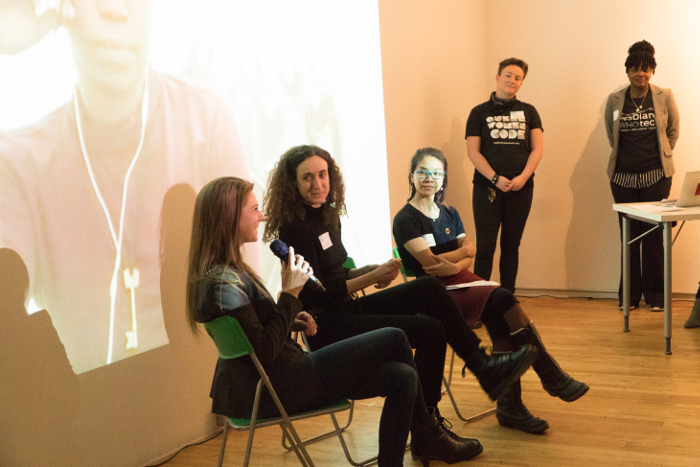Unless you are a very specific type of person (white, straight, and male), the tech industry is a frustrating place to work. The fact that one of the world’s fastest growing, most influential fields is so overwhelmingly male is concerning, because the growth and evolution of so many other related industries and many aspects of our daily lives rest in the hands of a single, khaki-clad demographic. Just ask your female-identifying friends in engineering—the STEM fields are a boys club. Women, particularly those who are not straight-identifying, can easily be made to feel unwelcome. Enter: Lesbians Who Tech.
Lesbians Who Tech was founded in 2012 in San Francisco by Leanne Pittsford in an effort to connect and empower queer and lesbian women working in technology. Since its conception, the organization has gone international, with branches active in 41 cities worldwide. Rebecca Woodmass and Rachel Jean Pierre run the Montreal chapter. Their most recent summit, held at Studio XX on Jan. 17, featured four panelists involved in Montreal’s LGBTQ+ community, focusing on the innovative and often unlikely ways that technology and art intersect.
Concordia graduate Nichole A. Lee holds a Bachelor of Fine Arts in art education and uses tech-based art projects to overcome the “digital divide” in low-income communities. Her work with queer youth and ally communities encourages self-expression while teaching practical skills such as computer literacy and photography. Likewise, Karine Robichaud is using her experience in the tech industry for community outreach, and her website KingCom.ca allows young entrepreneurs to connect and promote their products.
Multidisciplinary artist Julia Dyck, a regular on Studio XX’s weekly CKUT show, “The XX Files,” first got her start with the organization when she submitted a feminist science-fiction radio documentary called “Manage Your Emojis,” starring herself and Apple’s Siri. Dyck has since written and spoken extensively on the intersection of feminism and technology. She is also an experimental musician, performance artist, and freelance hairdresser.
The final panelist of the evening was Bleue Liverpool, a multimedia artist specializing in projection mapping and video. Liverpool was the 2017 recipient of the Mary Ellen Mark Scholarship. Her work involves interactive video projection and photography that explores what she calls “a diasporic third-world feminism.” Her work privileges the voices of immigrant women in marginalized communities.
“Being a woman and an authority in tech is really rewarding but really hard,” Liverpool said during the Q&A portion of the evening. “I can’t tell you how many times I’ve been the only queer, black woman in the room.”
All four panelists were invited to discuss not only their work, but the implications and possibilities of being a queer woman working in the tech industry. Much like sexuality, our definitions of art and technology are dynamic, vast, and ever-changing. Because of this fluidity, the tech industry—despite its flaws—is rife with opportunity.
“There has been a really specific set of people in charge of the technology we are producing, and what we have right now reflects a really specific set of values,” Dyck said. She believes that the merging of art and technology has produced what she calls “a rebellious daughter of capitalism and liberalism.”
Dyck’s work is heavily inspired by Donna Haraway’s 1984 essay “The Cyborg Manifesto,” a piece that explores the idea that science is a “rhetoric” that we are made to believe is objective.
Acknowledging sexuality in the workplace challenges our notions of what belongs where. Introducing different identities into a notoriously-homogenous industry has highlighted different needs and perspectives. Technology has been a driving force behind social change not only because of its ability to connect us but because it has expanded the existing definitions of art, education, and commerce.
“Sexuality [is reflected in] our art making,” Lee said. ”It reflects our creative selves and there’s no limit to expression.”
Although sexism and heteronormativity in tech remain prevalent issues, Lesbians Who Tech is a celebration of what’s right with the industry. The organization places enormous emphasis on the value of community and collaboration, both for its ability to connect artists and professionals, and include as many different voices as possible. Step by revolutionary step, Lesbians Who Tech is moving the tech industry forward.









